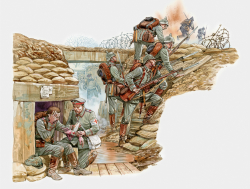A new approach to Ernst Jünger's intercultural encounters
Mainly famous for his memoir 'In Stahlgewittern' (Storm of Steel) – an account of his experiences in the trenches in World War One as a German officer – he published more than 50 volumes, including diaries, novels, stories and essays. The project EJICEN (Ernst Jünger's intercultural encounters) applied phenomenological research to hermeneutic literature. Specifically, project work was concerned with how Jünger approached, experienced and interpreted interpersonal encounters across perceived cultural divides – both during war and in every-day settings. Research considered Jünger's diaries, letters and published works, letters he received, third-party memoirs and audio recordings of conversations. The undertaking challenged notions of the writer being aloof and detached by highlighting intimate and careful exchanges. EJICEN examined the significance of these exchanges for Jünger's literary and intellectual works. Project research included reviews of works by two philosophers (Emmanuel Levinas and Bernhard Waldenfels) deemed to have a very different approach to personal relationships. Other activities involved archival research and analyses using a framework based on concepts from phenomenology. EJICEN's theoretical work on encounters was the basis of an international conference held in Bristol, United Kingdom in September 2014. The project also held roundtable discussions, with participants exploring ways in which encounters are conceived, conducted, remembered and traced. An edited volume documenting the results is being prepared. Another line of inquiry (of Jünger as a postcolonial author) was presented at a German studies conference and is also being prepared for publication. Further, the project contributed to a BBC documentary, 'War of Words: Soldier-Poets of the Somme', and published an article in the German magazine Cicero. The project generated great interest, both public and academic. Outreach events included a presentation at the Regensburg Film Festival, workshops for high school students, and a summer course for gifted and talented secondary school students. By researching Jünger's long-neglected travel diaries, EJICEN has contributed to a new approach to Jünger's works. The project lays the groundwork for a monograph on Jünger as a world writer keenly interested in exploring interpersonal encounters. Overall, Jünger's literary interests and strategies can now be considered an important reference point for humanist discourse.



